The 2023 Shanghai International Carbon Neutrality Technology, Products and Achievements Expo · Science Forum was held on June 11 in Shanghai. Centered around the core theme of “Science Leading Green Transformation, Joining Hands Towards Carbon Neutrality,” nearly 20 world-renowned scientific award winners, academicians from the Chinese Academy of Sciences and the Chinese Academy of Engineering, senior experts, scholars, and representatives from leading enterprises engaged in in-depth discussions.
Climate change, energy crises, and frequent extreme weather events continuously alert humanity: the goals of carbon peak and carbon neutrality are urgent, but achieving these “dual carbon” goals is a complex systemic project that spans decades. The attendees pointed out that this process requires not only macro strategic planning and breakthroughs in basic research but also integrated transformation explorations involving industry, academia, and research, as well as international communication and cooperation. Experts present believed that technological innovation is a crucial support for achieving the “dual carbon” goals. Through intergenerational inheritance and efforts, the “impossible triangle” of “safe and reliable, economically feasible, green and low-carbon” can be transformed into the “possible triangle” of a high-quality energy system.
This forum was co-hosted by the Tsinghua University Institute for Carbon Neutrality, the World Laureates Association, the Tsinghua University Institute of Climate Change and Sustainable Development, and the Shanghai Jiao Tong University Institute of Carbon Neutrality Development.
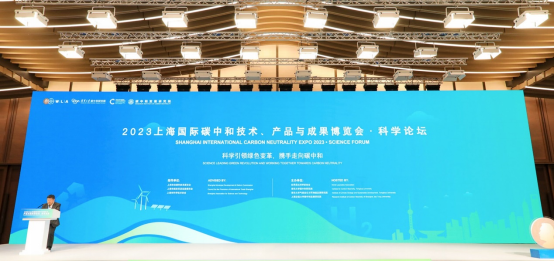
Global top minds gather for the “dual carbon” commitment
The forum attracted a gathering of distinguished guests, with top minds from home and abroad coming together to discuss the “dual carbon” commitment, sharing the latest cutting-edge scientific research and transformative technologies related to low-carbon energy and circular economy, and promoting international scientific and technological exchanges and cooperation.
John Hartwig, a 2019 Wolf Prize winner and a chemistry professor at the University of California, Berkeley, traveled from the United States to Shanghai to share feasible pathways and the latest research breakthroughs on achieving a more circular plastic economy.
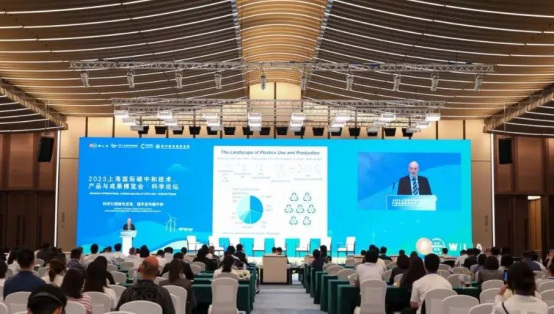
Akira Fujishima, a 2020 recipient of the International Science and Technology Cooperation Award of the People’s Republic of China, a professor at the University of Shanghai for Science and Technology, and an honorary professor at Tokyo University of Science, introduced the cutting-edge topic of “Photocatalytic Hydrogen Production and Carbon Conversion” in the field of international energy research. Zhong Lin Wang, the founding director and chief scientist of the Beijing Institute of Nanoenergy and Nanosystems, Chinese Academy of Sciences, and a recipient of the 2018 Eni Award and the 2019 Einstein World Science Prize, shared his recent research progress and insights from his work along the coastal area of Wenzhou, titled “From Fossil Energy to Ocean Blue Energy.”
Du Xiangwan, an academician of the Chinese Academy of Engineering, honorary dean of the Institute of Carbon Neutrality Development at Shanghai Jiao Tong University, and a senior scientific advisor at the China Academy of Engineering Physics, presented a video report titled “Reflections on China’s Strategy and Path to Achieve Carbon Peak and Carbon Neutrality,” proposing “eight major strategies” and “eight key measures” for achieving the “dual carbon” goals. He Kebin, an academician of the Chinese Academy of Engineering, dean of the Institute for Carbon Neutrality at Tsinghua University, and a professor at the School of Environment at Tsinghua University, delivered a speech on “Challenges and Systematic Solutions for the Doubling Development of Renewable Energy under the Background of Carbon Neutrality,” introducing key technologies for renewable energy consumption and source-network-load multi-link systems, and proposing systematic solutions for energy supply and consumption.
Huang Zhen, an academician of the Chinese Academy of Engineering, dean of the Institute of Carbon Neutrality Development at Shanghai Jiao Tong University, and a fellow of the International Combustion Institute, summarized the “three major characteristics of energy green transformation under the carbon neutrality goal,” pointing out that the world’s energy transformation will be achieved through a triad integration model led by policy, driven by technology, and supported by the market. Li Zheng, dean of the Institute of Climate Change and Sustainable Development at Tsinghua University, professor in the Department of Energy and Power Engineering at Tsinghua University, and secretary-general of the World University Climate Change Alliance, analyzed “the future paths and policy measures for China to achieve carbon neutrality.” Shawn Qu, an academician of the Canadian Academy of Engineering, founder, chairman, and CEO of Canadian Solar Inc., detailed the feasibility of “Ultra-High Voltage Transmission Supporting Large-Scale Applications of Green Hydrogen,” pointing out that electrification, renewable energy generation, and green hydrogen are the consensus pathways to achieve net-zero emissions. Zhao Yixin, dean of the Frontier Innovation Institute at Shanghai Jiao Tong University, and distinguished professor at the School of Environmental Science and Engineering at Shanghai Jiao Tong University, introduced perovskite solar cell technology under the title “Green Energy Driving Low-Carbon Technologies Towards Sustainable Energy.”
Two experts from the industry, Dr. Lou Jianfeng, Chairman and President of BASF Greater China, and Dr. Long Jisheng, Chairman and CEO of Kangheng Environment, shared insights from their respective companies. They introduced how chemical innovation drives sustainability and the achievements and benefits their companies have made in reducing carbon emissions in urban solid waste management.
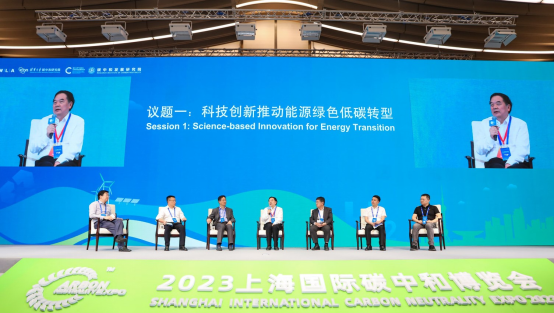
Focusing on the two topics of “Science-based Innovation for Energy Transition” and “Cutting-edge Circular Economy Solutions,” a roundtable discussion was held under the moderation of Academician Huang Zhen and Lu Xi, assistant to the dean of the Institute for Carbon Neutrality at Tsinghua University and professor at the School of Environment at Tsinghua University. Participants included Academician Bao Xinhe, president of the University of Science and Technology of China, Professor Li Xiong from the Wuhan National Laboratory for Optoelectronics (WNLO) at Huazhong University of Science and Technology, Professor Zang Zhigang from the College of Optoelectronic Engineering at Chongqing University, and Researcher Tao Fei from the School of Life Science and Technology at Shanghai Jiao Tong University, among others, along with Academician Wang Zhonglin, Professor Li Zheng, Professor Hartwig, Academician He Kebin, and Professor Zhao Yixin. Dr. Lou Jianfeng, Dr. Long Jisheng, and other representatives from the business sector also participated in the discussion.
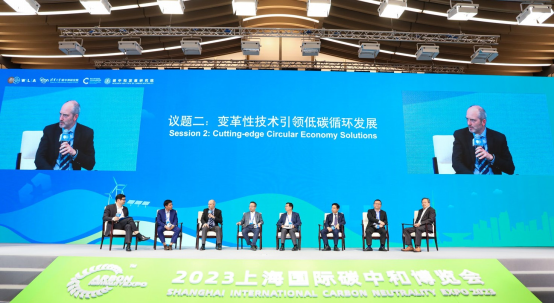
Official launch of the “Science for Carbon Neutrality Shanghai Initiative”
Global climate change, the energy crisis, and frequent extreme weather events have repeatedly signaled that a dangerous “tipping point” is approaching, making “carbon peaking and carbon neutrality” an urgent priority.
To call on the global scientific community to unite and contribute wisdom and strength to promote a global green low-carbon revolution and sustainable development, the Institute for Carbon Neutrality at Tsinghua University, the World Laureates Association, the Institute of Climate Change and Sustainable Development at Tsinghua University, and the Institute of Carbon Neutrality Development at Shanghai Jiao Tong University officially launched the “Science for Carbon Neutrality Shanghai Initiative” (referred to as the “Shanghai Initiative”) at the forum. The “Shanghai Initiative” focuses on three aspects: “vigorously promoting breakthroughs in frontier science and key technologies for carbon neutrality, vigorously advancing the construction of collaborative networks and communication platforms for carbon neutrality, and vigorously fostering high-level talent in the field of carbon neutrality science and technology.” It aims to promote change through science, address common challenges, and achieve human well-being. The initiative was jointly released by Wu Xiangdong, Executive Chairman of the World Laureates Association and Chairman of the Shanghai Center of the Association, Academician He Kebin, Professor Li Zheng, and Academician Huang Zhen.
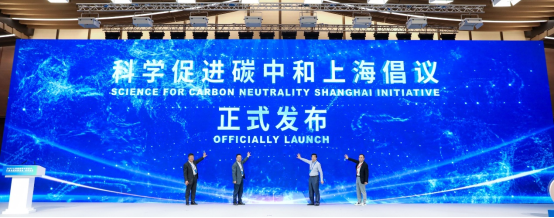
 Latest recommendations
Latest recommendations


